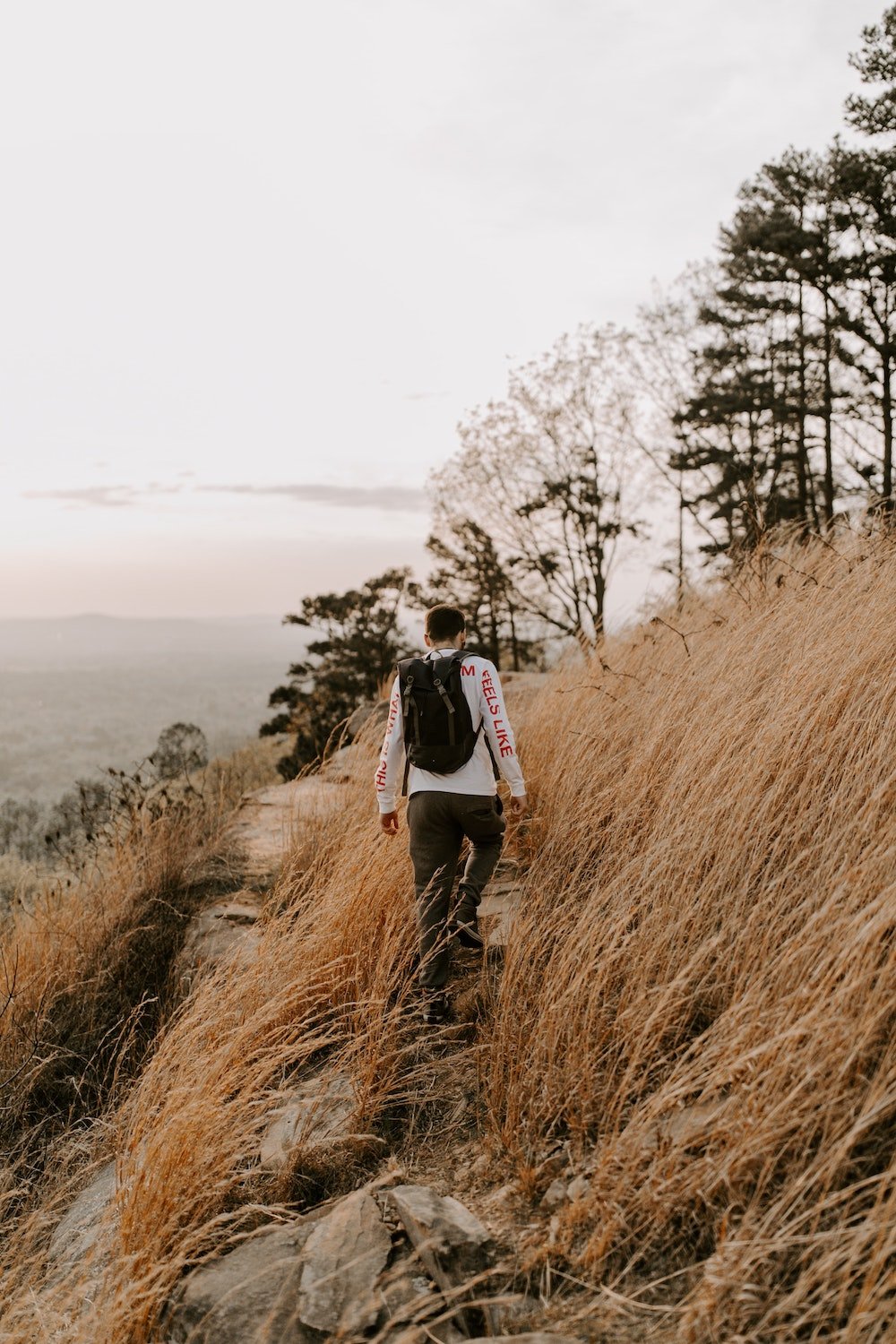With international travel being on hold for much of the world, would-be globetrotters have been satiating their appetite for foreign lands by going on adventures closer to home. Spending time outdoors and connecting with nature has been a fantastic way to escape the stresses of lockdowns and quarantines. On the flip side, there’s also been an increase in people who are heading out on the trails or into the woods who are novices, are not familiar with the local terrain, and are not carrying the appropriate supplies in their packs. Never be caught out in nature unprepared again with this ultimate packing checklist list for your next day hike. So think light, think slim (like your carbon fiber slim wallet) and remember, there is no such thing as being too prepared.
The Essential Travel Accessories

Weather Appropriate Clothing
Even if the weather forecast says it’s going to be a scorcher, pack for all weather systems, and think layers. You’ll want waterproof options, a warm jacket in case you get caught overnight, a couple of changes of dry socks, gloves, warm hat, supportive footwear. Always choose shoes or boots that will support your ankles, your arches and will provide good grip. And don't forget to swap out your old battered wallet for a carbon fiber slim wallet that's designed for maximum durability (and all types of weather).
Hydration
Most survival guides recommend packing a minimum of 1L of water, but if you’re someone who sweats profusely, you may want to double that. Dehydration is going to be one of your biggest enemies on the trail if you’re not prepared or don’t know where the closest (and safest) water source is.
Protein/Energy Packed Nutrition
Avoid caffeine, sugary drinks, empty carbohydrates and anything else that will your body will burn through because of its lack of nutrition. Think nuts and seeds mixes, protein bars, dried fruit, oatmeal, nut butters and bananas. Something else to consider (and you may not want to hear, especially if you’re hiking with mates and you’re having a bit of fun), is to leave the alcohol at home. Alcohol dehydrates the body, weakens the immune system and can impede your decision making, which is especially dangerous when you’re on a more challenging hike.
Navigation Equipment
Technology is brilliant, but it’s not always reliable when you’re in the middle of some trail, on your way up a mountain. Understanding how to read a map is a lost skill and will become essential if you think you’ve wandered off the trail. Tuck the map away in your carbon fiber slim wallet, and place it in a waterproof baggie to keep it safe. Also make sure to bring a fully charged cell phone, a portable charger, a GPS system and a compass.
Lighting
Even in the middle of the day, if you’re hiking in the alpine, dappled light can make it difficult to see markers, posts or signs. And if night falls and you’re forced to spend the night where you are, you’re going to need illumination. Pack a headlamp as well as a separate flashlight. Make sure the batteries are charged and fresh.
First Aid Kit
Knowing how to perform basic first aid is a life skill that every single one of us should have, regardless of whether we’re off on an outdoor adventure. Do yourself and your hiking party a favour, and take a basic survival training course before you set out. Knowing how to dress a wound, set a broken bone, treat a severe allergic reaction or stitch a cut will not only give you much-needed confidence, but could be the difference between life or death on the trail. Here are a few key items your first aid kit should have:
- Pocket Knife
- Antibacterial cream
- Assorted bandages & band-aids
- Gauze pads (large and small)
- Blister treatment (moleskin)
- Insect repellent, and bite treatment
- Medical tape
- Irrigation syringe
- Thermometer
- Medical scissors, tweezers, safety pins, scalpel
- Antihistamine for allergic reactions
- Ibuprofen (fevers, anti-inflammation, pain relief)
- Finger splints
- Anti-diarrhea, anti-nausea medication, eye drops
- Cotton swabs
- Alcohol
- Triangle bandage
- Stitching needles & thread
- Whistler
- ANY prescription medications that may be required by group members
Before you head out on your day hike, make sure you ask your hiking buddies if anyone has any special allergies or medications they may be taking in case an emergency takes place and you have to leap into action.
Fire Making Materials
Make sure you have a couple of lighters, plenty of waterproof matches, and flint on hand to make a fire if necessary.
Tarps & Emergency Blankets
You may not want to haul your sleeping bags around for an 8-10 hike, if your intention truly is to come home at the end of the day. But even so, if you do get caught in the outdoors, you want to be warm. The temperature drops significantly at night and the most common way hikers can guarantee a call into the local search and rescue organizations, is by not being prepared for the elements. A tarp can be used as a lean-to shelter, an emergency blanket will keep you warm for a night or two, away from the elements.
Waterproof/Sealable Bags
You won’t want to carry wet clothes around on your back, so bring something you can put them in to keep your pack dry. Also, you want to make sure you carry absolutely everything out that you brought in. All garbage, food scraps and any packaging must be taken out with you and disposed of in a rubbish bin when you find one.
Toilet Paper
Unless you’re well familiar with the foliage around where you’re hiking, and feel confident you won’t give yourself a wicked case of poison oak, or ivy, we don’t suggest using anything other than toilet tissue on your derriere!
Nice-To-Have Travel Accessories
Now that we’ve covered the must-haves for a day hike, here are a few ‘nice-to-have’ options that you may want to consider:
Quick Dry Towel
There are a number of moisture-wicking, terry-cloth style towels on the market that roll up into nothing, but are nice to have on hand if you decide to take a dip in a lake or river.
Camera/Go-Pro
If you’re traveling with friends, you’ll want to capture these nature-filled moments. Plus, you never know what you’ll see along the way.
Bear Spray/Bear Bangers
Depending on where you’re going hiking, bear spray may be something that is necessary for you and your hiking party to have on hand. This is especially the case if you’re hiking during the early spring months when mothers and their cubs are making their way through the woods. Make sure you know precisely how to use bear spray before you use it, you could end up seriously injuring yourself.
Binoculars
Do a bit of research on binoculars before you make a purchase as they can be quite heavy and burdensome. But if your intent, on your hike, is to enjoy nature along the way to your destination, invest in a powerful set of binoculars so you can enjoy your nature safari.
There are always more items that could be added to your pack, and of course, it will depend on what you’re doing, and the difficulty of your hike. The key things to remember are having enough water, food, appropriate clothing for the elements (including a carbon fiber wallet), a way to make fire and shelter, and a means to find your way in and out.





Share:
5 of The Most Mind-Blowing Places to Go Diving in Europe
7 Travel Accessories to Pack for Your Next Vacation